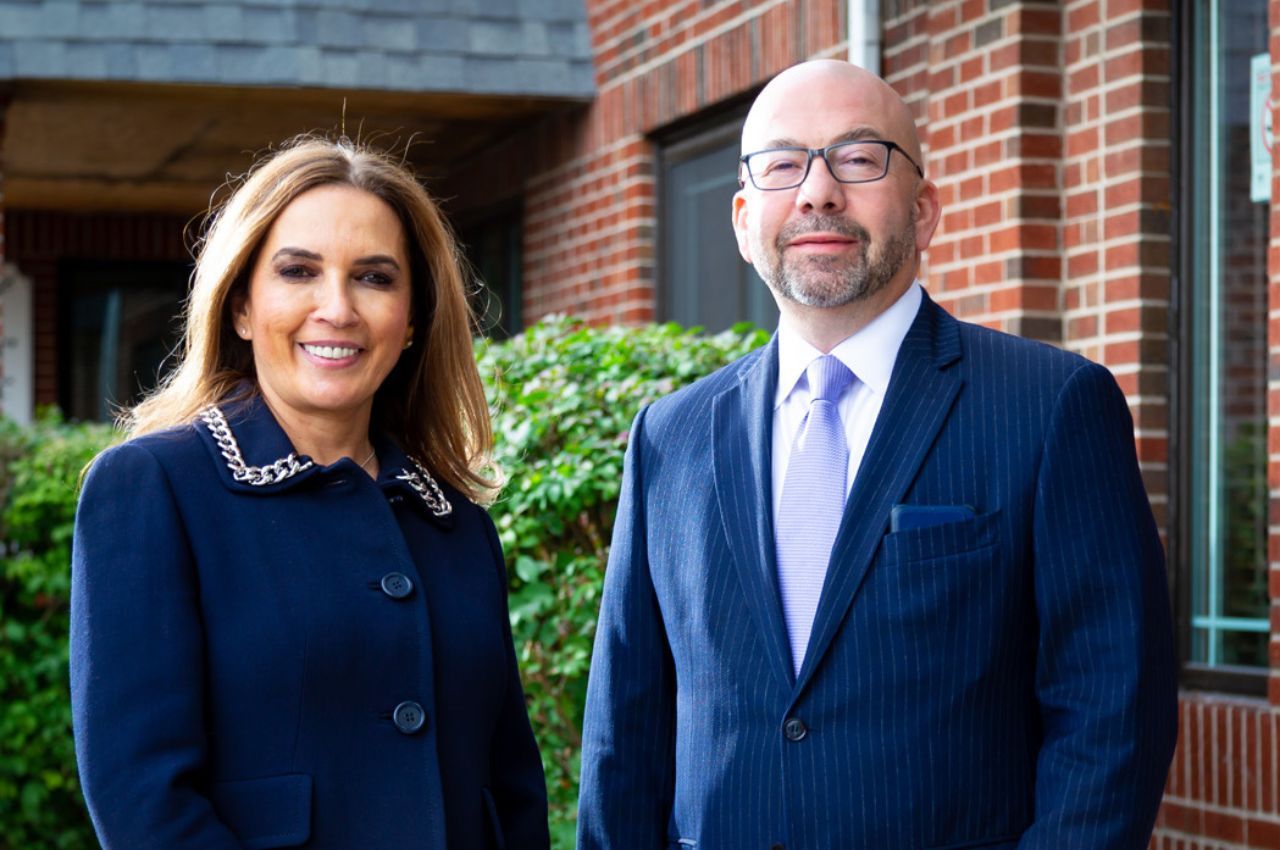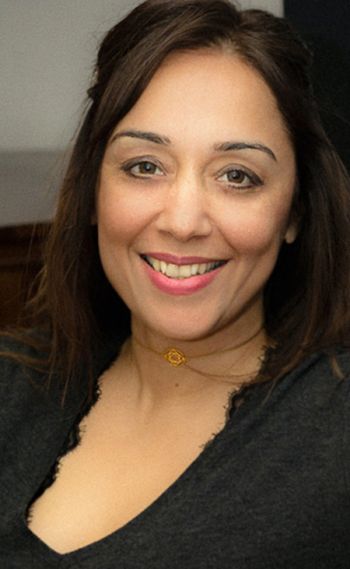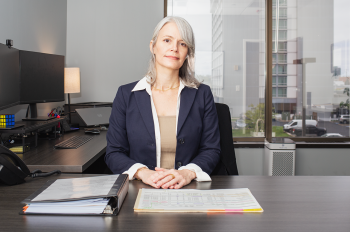Breaking Traditional Ground

Vivian Khalaf ’91 and Omar Abuzir ’99 have taken a lot of trips to Chicago’s O’Hare International Airport over the past several years.
Not to get on a plane. Not to give someone a ride. But just to talk to people who technically, under United States immigration laws, weren’t on U.S. soil since they had not yet been “admitted”: people halted by President Donald Trump’s executive order blocking immigration from a slew of Muslim-majority countries.
When practicing immigration law, there were always hurdles. But there were hurdles, and then there were hurdles. “People who were not allowed entry were also not allowed legal representation. Because they technically weren’t lawfully on U.S. soil, they had no rights....Things aren’t as easy as they used to be, not that they ever were,” Khalaf says.
So the two talked to family members, and immigration officers who were kind enough to respond. Certainly, they weren’t the only ones: there was a large-scale pro-bono effort involving nearly two-dozen attorneys taking shifts at O’Hare’s terminal five.
But Khalaf and Abuzir have made a name for themselves in helping those from Arabic-speaking countries. Chicago contains the largest Palestinian community in the U.S., and Khalaf began her practice decades ago as a groundbreaker: a female, Muslim, Arabic speaker in a private, community-based practice.
A rarity, if not a singularity.
“There were a handful of attorneys in general, all male, who had experience in the culture and were sensitive to the religion,” Khalaf says.
But as for Muslim women—community-based attorneys, as opposed to corporate attorneys—Khalaf says she was the only one she knew of when she started her firm in 1993, a few years after finishing law school. At Chicago-Kent College of Law, she remembers being one of only two female Arab Muslim students attending at the time.
Former client Tamara Haddad agrees: “There were no community-based Arab-American female attorneys who were experienced in immigration. I looked. She was the only one. She was the only Arab woman who had the ability to know what I was going through.
“We are not comfortable expressing our problems to men we are not related to,” Haddad explains. “It was very important for me to feel comfortable with my attorney. This woman is a blessing. A Malak,” she adds, using the Arabic word for angel.
Says Khalaf, “There’s a sense of comfort when a Muslim woman communicates with another Muslim woman who looks, speaks, and feels like her. I was the mirror image of many of these women who were heads of households, who were alone in the United States, whose husbands didn’t accompany them. So it was new, it was refreshing.”
Still, many clients, coming from a largely patriarchal community, questioned her out of habit.
“‘Are you really a lawyer, and can I see your degree? Maybe I can hire someone else to help you.’ I dealt with a lot of that,” Khalaf says. “The men had choices. If they didn’t like or weren’t comfortable with me, they could go elsewhere.
“Many of the women could not.”
***
Though she was born in Jerusalem, Khalaf’s family immigrated to the U.S. when she was six months old. She moved to Ramallah, Palestine, when she was 12 after her father got a job working for an oil company in Abu Dhabi.
Khalaf and Abuzir met through family: Khalaf went to a high school in Ramallah with Abuzir’s sister.
Abuzir, on the other hand, was born in Chicago; his father, who is from Palestine, owned a convenience store on the South Side. Neither his father nor his mother, who is from Colombia, had high school degrees, so they relied on Abuzir and his brother to review contracts and documents, even at an early age.
“I saw that, in helping my father and many of his friends in similar situations, there was a need for representation,” Abuzir says.
Abuzir clerked for Khalaf while attending Chicago-Kent, then started as an associate after he graduated in 1999.
Abuzir, who works out of the firm’s downtown Chicago office, believes the emotional reward he gets from his job is unlike anything he’d get from another field.
“Really, you see the deep impact it has on individuals, winning benefits or getting residency, how it completely changes their futures,” Abuzir says. “The feeling I get whenever someone wins a case and the joy they have is hard to describe.”
Abuzir points to a recent case, that of 43-year-old Haitham Hamad Awad Amli, who had been stranded on docket after docket—delay after delay—for 10 years.
A Palestinian who had applied for asylum in 2011, he continued to await resolution of his case for years, with judges retiring, their loads transferred.
“Every day before we had a court date, I went to buy a suit. I swear I have like 10 or 12 suits,” says Amli. “Every time, just one day before the court hearing, sometimes hours, they delayed the date for a year.”
And with his case pending, there was no way for Amli to return to Palestine to see his family, or bring them to the U.S.
“Ten years. My daughter was four when I left. She’s 14 now,” Amli says. Within the past year, one of his sons was hit and killed by a car. Every day, morning and night, he’d talk to his family on the WhatsApp messenger and share what he could.
Abuzir took the case in 2017. Finally, in 2019, Amli received a hearing and his asylum was granted. Last August, his family—their visas finally approved—was able to join him.
“Omar is honest,” Amli says, a compliment he doesn’t offer lightly after his experiences. “When we won I wanted to give him a gift, some money [beyond the attorney fees]. He wouldn’t take it; he put it back in my hand and said, ‘That’s not mine; that’s yours, for you, your wife, your kids. Just save it, keep it.’”
“Money’s money,” Abuzir says.
“But no amount of money in the world can replace reunifying a family,” agrees Khalaf.
On the other hand, if cases go awry, “I still carry this sense of guilt, that I was the reason they weren’t able to stay in the U.S. I haven’t been able to separate myself, Vivian the person, from Vivian the attorney,” she adds.
“I still go home and stay awake. Thinking about these cases.”
The two have tackled much larger cases. Back in 2020, when U.S. citizens were denied their federal stimulus checks for filing a joint tax return with a spouse who only had an Individual Taxpayer Identification number (as opposed to a Social Security number), the pair, along with two other attorneys, brought a class-action suit against the government in federal district court.
“It seemed like it was a clear violation of due process,” Khalaf says. “Eventually it became moot; we believe because of these lawsuits, there was enough pressure put on our congressional representatives to do the right thing.”
The second round of stimulus checks went out to such families, who also received the first payments retroactively.
More recently, the pair remains involved in a joint effort by the Arab American Bar Association and the South Asian Bar Association, who have teamed up to get families out of Afghanistan.
“Prior to this, I was never involved in such an effort. It didn’t happen during the war in Iraq,” Khalaf says. “Social media has affected everything from A to Z insofar as getting people involved in such issues.”
The firm has since grown significantly since it began, with offices in Palos Hills, Illinois, downtown Chicago, and Ramallah. But back when Khalaf started out, she sometimes didn’t get paid, or had to barter goods for services. One client paid her with a Persian rug.
“Because they couldn’t afford it. But that was OK. If that happened at a firm downtown, they’d show them the door and escort them to the elevator,” she says.
“But I saw the need. I filled a void.”


